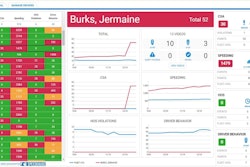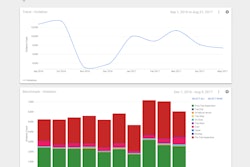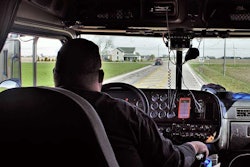The trucking industry has made big strides in safety but the trends have been moving in the wrong direction as of late.
 Dan Kaufman, director of development at Fleetworthy Solutions, is working on new updates to the company’s web portal that gives fleets visibility to compliance metrics.
Dan Kaufman, director of development at Fleetworthy Solutions, is working on new updates to the company’s web portal that gives fleets visibility to compliance metrics.Large truck and buses were involved in 4,317 fatalities in 2016. This was a 5.4 percent increase from 2015, which in turn was up 4.8 percent from 2014, according to the National Highway Traffic Safety Administration’s Fatal Motor Vehicle Crashes report.
Last year’s total was the highest since 2007.
By comparison, the commercial airline industry had a record safety year in 2016 with 19 fatal accidents worldwide resulting in 325 deaths — down from 560 in 2015. The last fatal crash in the United States was in Feb., 2009.
The aviation mindset towards compliance and safety is markedly different than in trucking where being “roadworthy” leaves room for interpretation.
To be “airworthy” an aircraft has to meet or exceed very strict Federal Aviation Administration regulations and extensive pre-flight checklists of airline mechanics and pilots.
“There’s a thing called an airworthiness directive — an AD,” explains Rob Getz, a former commercial pilot who has a degree in aerospace engineering. Whenever the FAA issues an AD for an aircraft, the owners and operators take the potential safety issue very seriously.
“You could still take (the aircraft) off, probably, but if something happened the liability would be astronomical,” he says.
Intelligent compliance
During a meeting with CCJ in Madison, Wis., Getz lays out a vision and goal to make roads safer. He joined Fleetworthy Solutions in 2016 as chief executive officer.
In September, Fleetworthy Solutions was launched as a rebranded version of ITS Compliance, which has provided compliance outsourcing services to commercial and private fleets for approximately 34 years. The company was founded as Interstate Transportation Services.
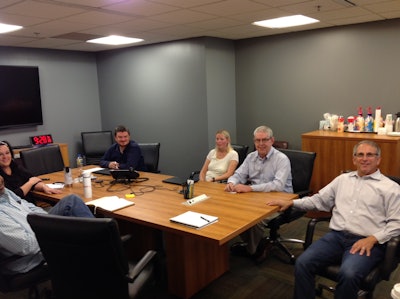 Rob Getz (far right) says Fleetworthy is working with like-minded customers who want to go beyond compliance to improve truck safety.
Rob Getz (far right) says Fleetworthy is working with like-minded customers who want to go beyond compliance to improve truck safety.To the company’s clients, Getz says the meaning of Fleetworthy encapsulates all of the daily services it provides to ensure the drivers and assets of a fleet are worthy to represent their company’s name on the road.
Prior to joining Fleetworthy, Getz was an executive at Five Cubits, a fleet management and telematics provider, that developed cloud-based software applications for ready-mix concrete fleets.
Getz sees an opportunity to differentiate Fleetworthy with technology among fleet compliance and risk management providers by leveraging big data and predictive analytics. Fleetworthy plans to partner with data scientists and invest a “significant amount of money” in new product development that will give its customers “forward visibility” of risk to help reduce accidents, he says.
As part of this effort the company plans to deepen its integration with fleet ELD and telematics application providers. Currently the integrations it has are focused on compliance by capturing and auditing hours-of-service, mileages and other data for customers.
With a deeper integration he envisions Fleetworthy will be able to capture and measure vehicle and driver behavioral data with consistency. The intended result will be new safety and compliance metrics for its customers to evaluate risk and take proactive steps to increase safety.
In addition to developing new data and analytical capabilities, the company is going through a review process to optimize the delivery of services with its people, processes and technology products. It has two full-time business analysts who are leading this effort.
The analysts are tasked with identifying the minimum FMCSA, IFTA and IRP requirements for each service, and any changes in process or technology that will improve the services to help customers go beyond compliance, he says.
“Through this philosophy we’re taking fleets of all types and sizes to new heights through the power of intelligent compliance,” he says.
Navigating complexity
ELDs and other technologies have helped fleets reduce paper and automate some routine compliance processes, but Fleetworthy executives see the demand for outsourcing continuing to grow as fleets are grappling with the complexity of doing it themselves.
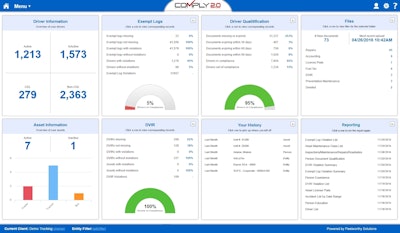 Fleetworthy’s customer portal has a dashboard of tiles that show fleets their own compliance metrics.
Fleetworthy’s customer portal has a dashboard of tiles that show fleets their own compliance metrics.Fleetworthy has more than 125 employees that are experienced in areas such as IFTA fuel taxes, hours of service auditing, IRP registration and licensing, driver qualification files, electronic document management, background investigation, drug and health screening, online training and testing, consulting and more.
When implementing ELDs, for example, fleets have more data to manage. Fleetworthy can capture the data electronically through the integration it has with ELD systems and deliver various kinds of exception reports as well as provide guidance from experts to help fleets correct patterns of violations, says Kim Brunner, vice president of client services.
Likewise, Fleetworthy has technology and people that can audit the accuracy of ELD records by matching drivers’ duty status — particularly the time logged as “off duty” — to a fleet’s dispatch data, fuel receipts, tolls and GPS records to help eliminate audit risks.
Weight and mileage taxes are another example of complexity, especially for fleets that operate in the state of New York. The highway use tax in New York involves a calculation of taxable miles (some toll roads are excluded), gross weight and unloaded weight.
With the integrations it has with telematics and dispatch software systems, Fleetworthy can accurately track the loaded and unloaded miles to prepare and file the tax returns.
“If we consume the data we can help them save money,” Brunner says.
Records retention is another reason why outsourcing is growing, she explains. The International Registration Plan (IRP) in 2015 announced that auditors can assess a 20 percent fee on top of a carrier’s annual vehicle registration and licensing costs if the carrier has inadequate records.
IRP auditors can ask for up to 6.5 years of vehicle licensing data, she says, and the fee rises to 50 percent if the carrier assessed the 20 percent fee has inadequate records during the next audit.
IFTA fuel taxes also have a long retention period. Whereas fleets typically retain driver logbook records for six months, the mileage and GPS data from ELD and telematics systems should be retained for a minimum of four years in the event of an audit, she says.
Assessing new risk
One of the centerpieces of Fleetworthy’s technology and services is a customer-facing portal that gives fleets a dashboard view of compliance. A number of new features and updates are coming, says Michael Precia, senior vice president of sales and account management.
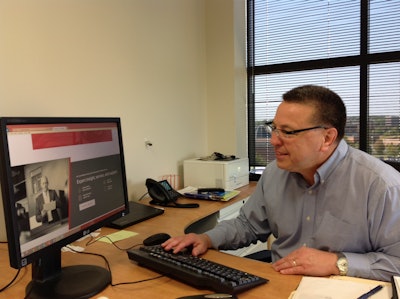 John Vosters, compliance strategy officer, stays on top of regulations and works with fleets to establish best practices.
John Vosters, compliance strategy officer, stays on top of regulations and works with fleets to establish best practices.The dashboard currently has a series of “tiles” and reporting functions that show fleets where they stand on hours-of-service, driver applications, and “whatever else they are measuring compliance on,” he says.
Fleetworthy is building a mobile notification and alerting service for management and executive teams based on information that fleets want to track. The alerting system will also be able to communicate directly with drivers through their mobile devices, he says.
New products will expand the online platform to help fleets assess risk and chart a path beyond compliance, he says. Besides using telematics data, the company plans to integrate with additional technologies fleets use such as CRM and accounting packages to consume the data and “lay algorithms on top of it.”
If a fleet has a problem with driver turnover, for example, the fleet could use the portal to monitor turnover predictors such as home time, income as well as other risk factors like fatigue from data sourced from various systems.
“We want to be the one stop shop,” he says.
When looking at the market of fleet safety and compliance products and services, Precia sees two types of companies—those that focus on technology and those who do consulting work. Very few are doing both.
Aiming for a higher standard
Fleetworthy’s business model is to deliver a tailored service solution that includes all the expertise, technologies, services and reporting needed to provide a bulletproof compliance and risk management platform at a 25 to 30 percent reduction from what prospective clients are spending internally, says John Vosters, compliance strategy officer.
Vosters says the new Fleetworthy brand reflects the company’s evolution over three decades of providing compliance solutions that exceed state and federal standards.
 Fleetworthy is building a mobile notification and alerting service for management and executive teams based on information that fleets want to track.
Fleetworthy is building a mobile notification and alerting service for management and executive teams based on information that fleets want to track.“Thirty-plus years of experience has taught us that for companies who want to excel in transportation, meeting just the minimum compliance standards isn’t enough,” he says. “It’s all about aiming higher in implementing best practices and risk mitigation processes. We call it Beyond Compliant.”
By demanding higher standards for both the company and its clients, Vosters says Fleetworthy will not only be able to minimize the impact of an audit or of the inevitable driver or vehicle incident, but its clients will build a better bottom line for their businesses.
“We aim to deliver cost-effective and very personalized levels of service with a high degree of integrity,” Vosters says. “And our efforts are reinforced by our clients who reward us through long-term trust. We foster long-term relationships and we’re very open to continually enhancing those relationships with flexibility.”
CCJ will be providing updates from Fleetworthy as the company is planning to announce several new products in coming weeks.



